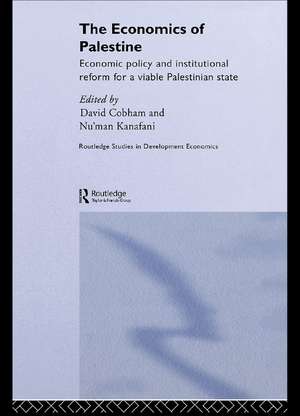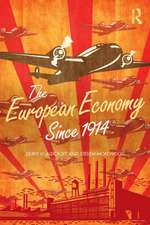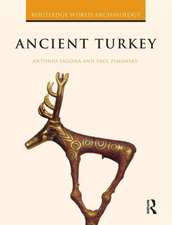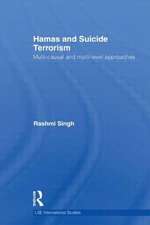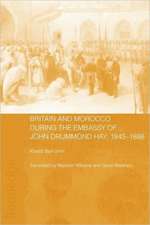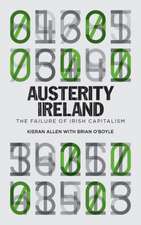The Economics of Palestine: Economic Policy and Institutional Reform for a Viable Palestine State: Routledge Studies in Development Economics
Editat de David Cobham, Nu'man Kanafanien Limba Engleză Paperback – 12 sep 2012
* adopt a non-discriminatory trade regime
* introduce a new currency with a currency board and later a hard peg to the euro
* establish a new type of pension scheme combining universal and work-based elements
* adopt an economic strategy geared to the modern knowledge-based global economy and based on the identification of clusters, and
* take a forward-looking approach to the compensation of refugees which relates compensation to the cost of absorbing returning refugees in a viable and growing economy.
Budgetary policy, corporate governance, financial sector reform and foreign aid strategy are also discussed, and an incomplete contracts model of integration is presented.
The contributors are internationally respected economists from a variety of countries and perspectives. Their analysis should be accessible and relevant to readers of many kinds, from students and academics involved with development economics, politics, and international relations through to policy-makers and those with a general interest in the Middle East.
| Toate formatele și edițiile | Preț | Express |
|---|---|---|
| Paperback (1) | 469.38 lei 6-8 săpt. | |
| Taylor & Francis – 12 sep 2012 | 469.38 lei 6-8 săpt. | |
| Hardback (1) | 1795.89 lei 6-8 săpt. | |
| Taylor & Francis – 29 iul 2004 | 1795.89 lei 6-8 săpt. |
Din seria Routledge Studies in Development Economics
-
 Preț: 309.74 lei
Preț: 309.74 lei -
 Preț: 327.17 lei
Preț: 327.17 lei -
 Preț: 326.49 lei
Preț: 326.49 lei -
 Preț: 311.41 lei
Preț: 311.41 lei -
 Preț: 394.37 lei
Preț: 394.37 lei - 8%
 Preț: 396.84 lei
Preț: 396.84 lei -
 Preț: 260.82 lei
Preț: 260.82 lei - 18%
 Preț: 1165.24 lei
Preț: 1165.24 lei - 15%
 Preț: 470.31 lei
Preț: 470.31 lei - 18%
 Preț: 1057.05 lei
Preț: 1057.05 lei - 18%
 Preț: 1225.29 lei
Preț: 1225.29 lei - 18%
 Preț: 1113.63 lei
Preț: 1113.63 lei - 18%
 Preț: 1300.62 lei
Preț: 1300.62 lei - 26%
 Preț: 878.42 lei
Preț: 878.42 lei - 18%
 Preț: 1166.05 lei
Preț: 1166.05 lei - 18%
 Preț: 1059.45 lei
Preț: 1059.45 lei -
 Preț: 381.11 lei
Preț: 381.11 lei - 25%
 Preț: 823.63 lei
Preț: 823.63 lei - 21%
 Preț: 361.84 lei
Preț: 361.84 lei - 16%
 Preț: 274.01 lei
Preț: 274.01 lei - 18%
 Preț: 1060.87 lei
Preț: 1060.87 lei - 18%
 Preț: 1168.85 lei
Preț: 1168.85 lei - 18%
 Preț: 1171.89 lei
Preț: 1171.89 lei - 18%
 Preț: 1068.18 lei
Preț: 1068.18 lei - 18%
 Preț: 1060.19 lei
Preț: 1060.19 lei - 18%
 Preț: 1341.98 lei
Preț: 1341.98 lei - 18%
 Preț: 1169.16 lei
Preț: 1169.16 lei - 18%
 Preț: 1057.05 lei
Preț: 1057.05 lei - 15%
 Preț: 714.66 lei
Preț: 714.66 lei - 18%
 Preț: 1287.06 lei
Preț: 1287.06 lei - 18%
 Preț: 1124.73 lei
Preț: 1124.73 lei - 18%
 Preț: 1157.34 lei
Preț: 1157.34 lei - 27%
 Preț: 832.80 lei
Preț: 832.80 lei - 26%
 Preț: 850.91 lei
Preț: 850.91 lei - 18%
 Preț: 1066.79 lei
Preț: 1066.79 lei - 25%
 Preț: 658.19 lei
Preț: 658.19 lei - 25%
 Preț: 992.63 lei
Preț: 992.63 lei - 18%
 Preț: 1069.23 lei
Preț: 1069.23 lei - 15%
 Preț: 703.08 lei
Preț: 703.08 lei -
 Preț: 395.63 lei
Preț: 395.63 lei - 18%
 Preț: 706.91 lei
Preț: 706.91 lei -
 Preț: 422.96 lei
Preț: 422.96 lei - 18%
 Preț: 1055.38 lei
Preț: 1055.38 lei - 27%
 Preț: 993.85 lei
Preț: 993.85 lei - 18%
 Preț: 707.10 lei
Preț: 707.10 lei -
 Preț: 409.19 lei
Preț: 409.19 lei
Preț: 469.38 lei
Nou
Puncte Express: 704
Preț estimativ în valută:
89.82€ • 94.01$ • 74.76£
89.82€ • 94.01$ • 74.76£
Carte tipărită la comandă
Livrare economică 01-15 aprilie
Preluare comenzi: 021 569.72.76
Specificații
ISBN-13: 9780415649148
ISBN-10: 0415649145
Pagini: 324
Dimensiuni: 156 x 234 x 17 mm
Greutate: 0.45 kg
Ediția:1
Editura: Taylor & Francis
Colecția Routledge
Seria Routledge Studies in Development Economics
Locul publicării:Oxford, United Kingdom
ISBN-10: 0415649145
Pagini: 324
Dimensiuni: 156 x 234 x 17 mm
Greutate: 0.45 kg
Ediția:1
Editura: Taylor & Francis
Colecția Routledge
Seria Routledge Studies in Development Economics
Locul publicării:Oxford, United Kingdom
Public țintă
Postgraduate and ProfessionalCuprins
1. Introduction 2. The Choice of Trade Regime Depends on Multiple Other Factors 3. Alternative Currency Arrangements 4. Budgetary and Fiscal Policy 5. The Role of the Financial Sector 6. Company Law and Corporate Governance 7. Structuring a Pension Scheme for a Future Palestinain State 8. Strategies for Economic Development, the Role of Gaza, and the Future of the Refugee Camps 9. Foreign Aid Strategy 10. Absorbing Returnees in a Viable Palestinian State: A Forward Looking Macroeconomic Perspective 11. Incomplete Contracts, the Port of Gaza, and the Case for Economic Sovereignty
Notă biografică
David Cobham is Reader in Economics at the University of St. Andrews, Scotland.
Nu'man Kanafani is Associate Professor at the Royal Veterinary and Agricultural University in Copenhagen, Denmark.
Nu'man Kanafani is Associate Professor at the Royal Veterinary and Agricultural University in Copenhagen, Denmark.
Recenzii
'A peaceful solution between Israel and a Palestinian State will be sustainable and stable only when the Palestinians will enjoy the economic dividends of peace. This book captures the main economic issues and presents the required economic policies that will secure economic prosperity for a newly born Palestinian State.' - Haim Ben-Shahar, Emeritus Professor of Economics, Tel Aviv University
'How should a sovereign Palestinian state design its economic institutions and how should it run its economy? This book contains new and innovative research on these topics. It is essential reading for all those interested in peace and prosperity in the region, irrespective of their political persuasions. It also makes good reading for those interested in the interplay between politics, institutions and economic development.' - Christopher Pissarides, Professor of Economics, London School of Economics
'Cobham and Kanafani, aided by the rich contributions of an impressive array of international experts, have produced what is clearly the most learned and comprehensive work on the economy of the future state of Palestine. This volume combines the indispensable objectivity of economic analysis, a clear understanding of the policy experience and practices of successful countries, as well as a thorough appreciation of the political context, to derive highly relevant conclusions and policy implications. We owe Messrs. Cobham and Kanafani a debt of gratitude for so ably informing us about economic conditions and prospects in Palestine and, more significantly, for their considered and timely contribution to the cause of a Middle-East peace that is anchored in an economically viable and sovereign Palestinian state.' - Dr George Abed, Director, Middle East and Central Asia Department, IMF, 2002-2003
'A peaceful solution between Israel and a Palestinian State will be sustainable and stable only when the Palestinians will enjoy the economic dividends of peace. This book captures the main economic issues and presents the required economic policies that will secure economic prosperity for a newly born Palestinian State.' - Haim Ben-Shahar, Emeritus Professor of Economics, Tel Aviv University
'This book is a solid contribution to our understanding of the economic policy issues that will face decision makers in a sovereign and independent Palestinian state in the context of separation from Israel. It presents interesting recommendations regarding key issues that are more than likely to evoke intense debate amongst economists and politicians alike.' - Nabeel Kassis, PNA Minister of Planning, previously Director of the Palestine Economic Policy Research Institute (MAS)
'The book is the first of its kind to put forth an agenda for economic policies and institutional reforms, necessary for a viable Palestinian economy that could be integrated into the world economy, and serve as a host for foreign direct investment.' - Assaf Razin, Professor of Public Finance, Tel Aviv University
'Coming from an impressive list of international scholars including both Arabs and Israelis, the book is "must reading" for economists and policy makers interested in identifying the policy and institutional requirements of any Palestinian state and indeed of any small state.' - Jeffrey B. Nugent, Professor of Economics, USC and President, Middle East Economic Association
'Based on a politically viable settlement of the Israeli-Palestinian conflict, this book offers a comprehensive economic framework for an independent Palestinian state which any scholar of the region must study and policy-makers should take account of.' - Efraim Sadka, Professor of International Capital Markets, Tel Aviv University
'How should a sovereign Palestinian state design its economic institutions and how should it run its economy? This book contains new and innovative research on these topics. It is essential reading for all those interested in peace and prosperity in the region, irrespective of their political persuasions. It also makes good reading for those interested in the interplay between politics, institutions and economic development.' - Christopher Pissarides, Professor of Economics, London School of Economics
'The wide range of issues treated in this futuristic volume makes it a most welcome addition to the literature on the economy of Palestine.' - Elias Tuma, Professor Emeritus of Economics, University of California
'How should a sovereign Palestinian state design its economic institutions and how should it run its economy? This book contains new and innovative research on these topics. It is essential reading for all those interested in peace and prosperity in the region, irrespective of their political persuasions. It also makes good reading for those interested in the interplay between politics, institutions and economic development.' - Christopher Pissarides, Professor of Economics, London School of Economics
'Cobham and Kanafani, aided by the rich contributions of an impressive array of international experts, have produced what is clearly the most learned and comprehensive work on the economy of the future state of Palestine. This volume combines the indispensable objectivity of economic analysis, a clear understanding of the policy experience and practices of successful countries, as well as a thorough appreciation of the political context, to derive highly relevant conclusions and policy implications. We owe Messrs. Cobham and Kanafani a debt of gratitude for so ably informing us about economic conditions and prospects in Palestine and, more significantly, for their considered and timely contribution to the cause of a Middle-East peace that is anchored in an economically viable and sovereign Palestinian state.' - Dr George Abed, Director, Middle East and Central Asia Department, IMF, 2002-2003
'A peaceful solution between Israel and a Palestinian State will be sustainable and stable only when the Palestinians will enjoy the economic dividends of peace. This book captures the main economic issues and presents the required economic policies that will secure economic prosperity for a newly born Palestinian State.' - Haim Ben-Shahar, Emeritus Professor of Economics, Tel Aviv University
'This book is a solid contribution to our understanding of the economic policy issues that will face decision makers in a sovereign and independent Palestinian state in the context of separation from Israel. It presents interesting recommendations regarding key issues that are more than likely to evoke intense debate amongst economists and politicians alike.' - Nabeel Kassis, PNA Minister of Planning, previously Director of the Palestine Economic Policy Research Institute (MAS)
'The book is the first of its kind to put forth an agenda for economic policies and institutional reforms, necessary for a viable Palestinian economy that could be integrated into the world economy, and serve as a host for foreign direct investment.' - Assaf Razin, Professor of Public Finance, Tel Aviv University
'Coming from an impressive list of international scholars including both Arabs and Israelis, the book is "must reading" for economists and policy makers interested in identifying the policy and institutional requirements of any Palestinian state and indeed of any small state.' - Jeffrey B. Nugent, Professor of Economics, USC and President, Middle East Economic Association
'Based on a politically viable settlement of the Israeli-Palestinian conflict, this book offers a comprehensive economic framework for an independent Palestinian state which any scholar of the region must study and policy-makers should take account of.' - Efraim Sadka, Professor of International Capital Markets, Tel Aviv University
'How should a sovereign Palestinian state design its economic institutions and how should it run its economy? This book contains new and innovative research on these topics. It is essential reading for all those interested in peace and prosperity in the region, irrespective of their political persuasions. It also makes good reading for those interested in the interplay between politics, institutions and economic development.' - Christopher Pissarides, Professor of Economics, London School of Economics
'The wide range of issues treated in this futuristic volume makes it a most welcome addition to the literature on the economy of Palestine.' - Elias Tuma, Professor Emeritus of Economics, University of California
Descriere
How would Palestine organize itself as a state economically? A respected, international group of academics have come together under the editorship of Cobham and Kanafani to analyze and attempt to answer this difficult question.
